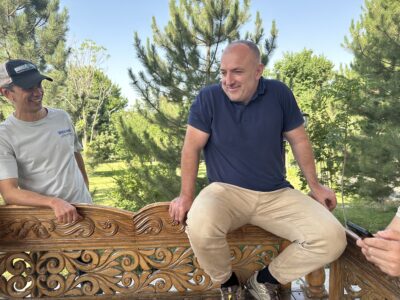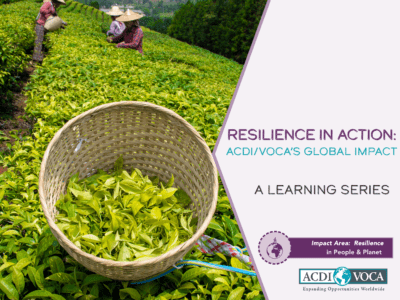
ABOUT THIS SERIES
Intersectionality is the idea that multiple or overlapping identity factors shape a person’s power and privilege and the related – how this has an impact on their access to, participation in, and benefit from the development process.
In part one of this blog series, we discussed intersectional approaches to Gender, Youth, and Social Inclusion (GYSI) Analysis. In this blog, we shift our focus to implementing intersectional development activities and how it’s never too late to apply an intersectional lens. Check out lessons learned below from ACDI/VOCA-led projects working with youth in Serbia, Colombia, and Honduras.
Why Intersectionality Matters in Global Development
Traditional implementation of a development program often responds to inequalities faced by specific groups, such as women, youth, people with disabilities, or ethnic minorities. However, many activities are not designed for the intersecting diversity within and across these groups. Failing to understand and design activities tailored to the unique experiences of intersectional groups reduces program and intervention effectiveness.
Lessons from our Intersectional Approaches to Youth Economic Development
ACDI/VOCA is committed to pushing the boundaries in our GYSI practices and intersectional approaches, specifically when it comes to working with youth. Here are five lessons from our efforts to be more intersectional in our approach to project implementation:
- Build staff and implementing partner awareness and capacity. Many people only have a theoretical understanding of intersectionality, while others have never heard of the concept. Ensuring staff and implementing partners not only understand the terminology but also know what supporting specific communities looks like is critical.
- Create a supportive environment. When dealing with marginalized populations, especially those who are more marginalized due to their intersectional identities, creating a supportive environment allows them to strengthen their own protective environments and generate new support networks both inside and outside the project. Establishing trust between marginalized populations and the project creates a bond that mitigates the likelihood of attrition. Connecting target groups with support services, such as psychological and legal support provided by partners, can support more impactful project outcomes by mitigating external risks.
- “Nothing about us without us.” Engaging target populations directly in project design, implementation, and evaluation ensures contextually appropriate activities grounded in local knowledge and experience that align with the needs and priorities of those directly affected. Involving everyone minimizes the risk of unintended negative consequences and fosters ownership and sustainability.
- Building trust takes time. Working with local organizations led by or representing these intersectional populations is important, but these organizations can sometimes be wary of partnerships due to negative past experiences. Start slowly by getting to know one another’s approaches, desires, and needs. Require minimal initial resources and allow for relationships to form, which can lead to deeper commitment and collaboration over time. Demonstrate your organization’s commitment and passion and assure partners you are not just “checking a box.” This approach also facilitates outreach to the target populations, particularly when there has been no previous engagement.
- Leverage challenges to create opportunities for intersectional approaches. To overcome cultural barriers and biases that may be held by partners, especially the private sector, refocus on how a particular population could be the solution to a challenge holding those partners back. If the benefit to partner is clear, they may overcome initial hesitations.
What Does it Look Like in Practice?
Below are lessons learned from three ACDI/VOCA projects that have intentionally designed and implemented activities with diverse youth populations.
In Serbia, Uniting Market Actors to Support Ethnic Minority Youth
The Big Small Businesses Project, funded by USAID, empowers the growth of small- and medium-sized enterprises (SMEs) in two sectors: (1) equipment and machinery and (2) agriculture and food. We help link SMEs with business support providers to improve their productivity and profitability, expand markets, strengthen access to finance, and develop a qualified and diversified workforce. The project applies a market systems approach that puts Serbian economic players in the lead and expands opportunities for rural women, youth, and other marginalized groups.

Serbia’s five university centers in big cities have solid dual educational systems, but underdeveloped regions face challenges. There, the project is working with technical and vocational education and training (TVET) institutions to address the private sector’s need for skilled labor and access to technology for research and development. The project partnered with a business service provider to work with the local TVET, which serves as a key educational institution for rural and ethnic minority young people.
Together with the partner, the project modernized two study programs and established a Rapid Product Development (RPD) Hub, which is now integrated into the curriculum. The RPD Hub fosters close cooperation between local SMEs and students through problem-solving sessions, which help SMEs design and create prototypes of specific machine elements and build the practical skills of students from diverse ethnic backgrounds.
The project soon realized that youth from specific ethnic communities faced additional challenges, such as language barriers and physical distance from the TVET. To address these issues, the project worked with the TVET and partner to ensure all lectures were conducted in local languages and RPD Hub equipment was available in local high schools nearby for the practical part of the lectures.
We worked with 108 students (45 percent women and 20 percent members of ethnic minorities) and 27 SMEs (30 percent women-owned and 26 percent youth-owned). The project has adapted the approach and is currently replicating it in the agriculture and food sector for the coming year.
In Honduras, Supporting a Local LGBTQI+ Organization to Expand Youth Economic Opportunities
The USAID Transforming Market Systems (TMS) Activity is a nine-year program addressing deep-rooted, systemic challenges within Honduras’s economy. Its goal is to create more and better inclusive job opportunities, which will help reduce the incentives for migration and provide economic opportunities for vulnerable Hondurans.
Despite a goal of including LGBQTI+ individuals in activities, TMS realized through regular monitoring that they had been unsuccessful because program partners did not understand this population and were not sufficiently addressing their unique needs. In response to these findings, TMS co-designed a pilot program in collaboration with SOMOS CDC, a local organization with extensive experience promoting the rights of the LGBTQI+ community. During the co-creation process, SOMOS CDC shared with TMS the unique needs of the LGBTQI+ community. They highlighted their emerging SOMOS BUSINESS initiative, which aimed to address these needs but struggled to make progress due to a lack of support. TMS followed their lead and agreed to support this interesting idea through refinement and expansion, including a particular focus on LGBTQI+ youth who have less access to capacity building, finance, and networks.
The pilot program now empowers more than 300 LGBTQI+ youth in the five major cities of Honduras by providing them with tools and skills to create and manage their own businesses. The program also helps connect youth to a day center, a safe space where young LGTBQI+ individuals can receive psychological support aimed at developing emotional skills for their growth, along with legal guidance to help them understand their rights.
In Colombia, Supporting Youth with Disabilities
The Youth Resilience Activity (YRA) is a five-year program funded by USAID that equips youth in high-risk environments in 30 municipalities of Colombia with the technical tools and life skills to reach their potential and become agents of positive social transformation. Supported by a Gender, Intersectionality, and Social Inclusion (GISI) Strategy, the Activity integrates GISI throughout its work and shares knowledge on the GISI and youth resilience nexus, including what works in the Positive Youth Development space.
During the co-creation phase of a project focused on agro-tourism, YRA identified an opportunity to include youth with disabilities; however, the partner had no experience working with this population. YRA identified a local organization with 50 years of experience working with people with disabilities. This second partner was brought in to train the implementing partner staff on working with youth with disabilities. Over 14 months, we engaged 105 youth participants in sustainable agricultural production, sustainable tourism, digital content creation, and entrepreneurship. Of them, 13 were rural youth with disabilities. In a post-evaluation, most participants said the training had a significant impact on their life in terms of inclusion, professional development, and contribution to society.
There’s More to Learn
We hope this exploration of ACDI/VOCA-led projects in Serbia, Colombia, and Honduras shows what it looks like to apply an intersectional lens to program implementation. As an organization that is committed to continuously pushing the boundaries in our inclusive practices, ACDI/VOCA continues to learn and adapt. While we have made strides in understanding and addressing the complex nature of intersectionality, we don’t have all the answers. We hope to inspire further discussion, especially related to the impact of intersectional approaches on program outcomes, and energize the GYSI community as we work together to promote intersectional approaches.
Read the Importance of Intersectionality: Part One here.
Comments






